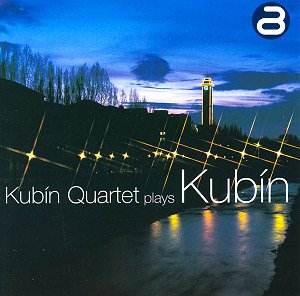Kubín
was born in the industrial city of Ostrava
in 1909, moving to Prague in 1924 to
study at the conservatoire. A preternatural
composing talent he rapidly absorbed
his teacher, Alois Hába’s, quarter-tone
innovations and at seventeen turned
out the Quartet No 1 heard on this disc
– a work of considerably advanced thinking
from anyone, let alone a youth of seventeen.
He also studied cello and earned his
bread and butter as a rank and file
player in the Czech Radio Symphony Orchestra
before, in his mid twenties, returning
to the city of his birth to work with
Erwin Schulhoff at Ostrava Radio. His
eminence increased and he took an increasingly
prominent position in Moravian musical
life before his relatively premature
death in 1973.
Beginning
as an out and out disciple of Hába,
Kubín gradually came to embrace
influences such as Stravinsky and Honegger
and one feels in his music the recognition
of a personal voice through a period
of experimentation. In his later years
he churned out some Socialist Realist
stuff – I remember once listening to
his songs in praise of the miners of
various countries, including Britain’s,
sentiments doubtless lost on the men
concerned – but the best of his music,
the Sinfonietta included, has a distinctive
voice of its own.
The
1926 Quartet is in three movements.
It’s strongly compounded of Hába
and atonalism but manages to preserve
an essentially youthful confidence,
strong, sonorous and powerful and to
contrast it with more expressive moments,
especially in the opening movement.
He utilises fugato and tremolando effects
not simply as motivic or colouristic
devices but as strongly active material
and has the theatrical sense to end
the movement in violent drama. The slow
movement is certainly a malign affair
for one so young, its poisoned lyricism
bespeaking of feelings supposedly removed
from the experience of a seventeen year
old. It grows more yearning and wistful
but remains essentially unyielding.
The finale is a banish-all-care perky
Rondo.
The Humoresque
dates from 1961 and is scored for violin,
viola, cello and clarinet. It’s in five
movements entitled On the Train,
Evening Bells, Modern Love
and so on. There’s plenty of musical
onomatopoeia here. On the Train
charts the gathering of steam (Pacific
231 it’s not however) and elides this
with some nice dance music in the slower
section. Evening Bells are conveyed
through ingenious use and deployment
of pizzicati and in the middle we have
Kinematophone, an intermezzo-allegretto
type of movement. Here Kubín
mines some cornball, blues tinged and
show tunes, adding some fox trotting
for fun. His idea of Modern Love
is pretty mordant and watchful, with
any romance more than somewhat guarded
– and his Clown, the final movement,
is a roguish fellow indeed. The
little Concertino for the unlikely combination
and Double Bass and octet – where the
eponymous Kubín Quartet are joined by
Květoslav Borovička and the
Akademia Quartet – certainly plunges
into the sepulchral depths with the
bass sawing away like a laryngitic
bassoon and some neo-classical wind
writing betraying some influences.
The
recordings derive from Ostrava radio
and have been expertly restored though
no dates are given; the disc is also
rather short measure but those prepared
to take a chance will encounter a lesser,
though still significant, product of
the Czech Republic’s recent history.
Jonathan
Woolf
see
also review
by Rob Barnett
The
Arcodiva catalogue is now offered by
MusicWeb

![]() for
details
for
details